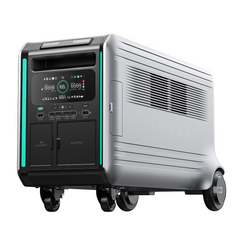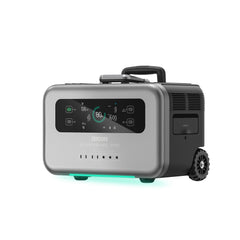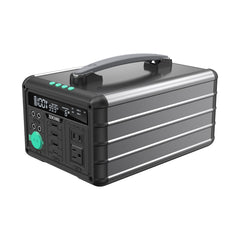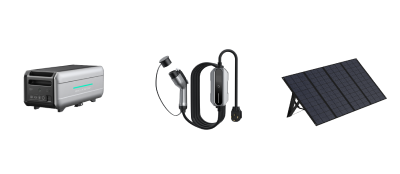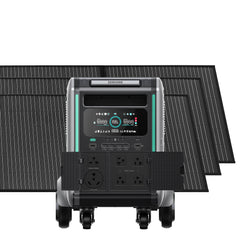Comprehensive Guide for Choosing Solar Generator for Your RV
Why Would You Want a Solar Generator for RV?
There are several benefits you can get from using a solar generator for your RV. First of all, it will provide you with a renewable energy source.
Since solar generators use the sun's photons to generate electricity, they make a clean and renewable source of energy, sparing you to the need to rely on fossil fuels, which can be costly and damaging to the environment.
Once you've installed a solar generator on your RV, it can be an efficient way to produce electricity. You won't have to pay for fuel, and you may even be able to sell excess power back to the grid.
In addition, you're not reliant on hooking up to electrical outlets or finding a campground with electrical hookups. This gives you the freedom to camp wherever you like, without worrying about energy needs.
Unlike generators that use gasoline or propane as their fuels, solar generators run without any noise, which is a good thing, especially when you're camping in close proximity to others.
Solar generators also require little maintenance, which means you can spend more time enjoying your RV and less time worrying about maintaining it.
With all of the aforementioned benefits, a solar generator is a great investment for those who want to be more environmentally friendly, save money, and have greater independence when camping.
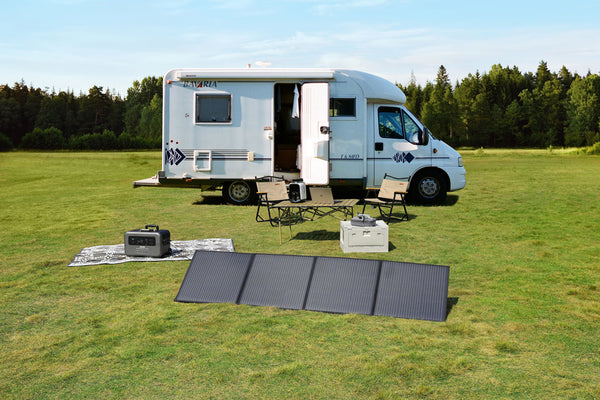
Can a Solar Generator for RV Replace Your Gas Generator?
A solar generator for RV can be a perfect replacement for a gas generator in certain circumstances. A solar generator uses solar panels to generate electricity and store it in batteries for later use, while a gas generator uses gasoline to power a motor that generates electricity.
If you have enough solar panels and batteries to produce and store the amount of electricity you need, then a solar generator can be a great alternative to its gas counterpart.
Solar generators are typically quiet, require very little maintenance, and don't produce any emissions, making them a more environmentally friendly option.
However, if you have high power demands or frequently use your RV in areas with limited sunlight, a solar generator may not be able to meet your energy needs.
In these cases, a gas generator may be a better choice. It's important to evaluate your energy requirements and usage patterns before deciding whether a solar generator can replace a gas generator for your RV.
How to Choose the Best Solar Generator for RV?
When shopping for a reliable solar generator for your RV, you need to account for factors like the size of the vehicle, the duration of use, and the power needs.
For starters, find out the amount of power needed to run your electronics and appliances. You can do this by making a list of all the devices you intend to use, and jotting down their wattage consumption and how many hours you will use them in a day.
After identifying the wattage and operational time for each device, calculate the overall power they require. Add up the wattage of all devices and multiply it by the total hours you plan to use them. This will give you the total watt-hours (Wh) per day.
The next step is choosing a solar generator with enough capacity. Based on your total power requirement, pick a solar generator that has enough capacity to meet your needs. Look for a generator that packs at least 50% more battery capacity than your daily watt-hour requirement.
It's also worth noting that a solar generator is only helpful if it can be recharged effectively, so make sure to consider the solar panel capacity as well. Choose a generator that comes with a panel that can charge the battery in a reasonable amount of time.
The generator should have a built-in inverter too, since it must convert the generated DC into AC power that can be used by your RV.
Durability and portability are the next important factors to consider. An RV solar generator should be durable enough to endure the rigors of travel. You will want it to be compact, lightweight, and portable so that you can easily carry it around. Also make sure that it's built with high-quality materials that can withstand the elements.
The last thing you can't skip is checking for any additional features that may be useful, such as AC outlets, USB charging ports, and LCD screens that display battery capacity and charging status. These features can make your travels more comfortable and convenient.
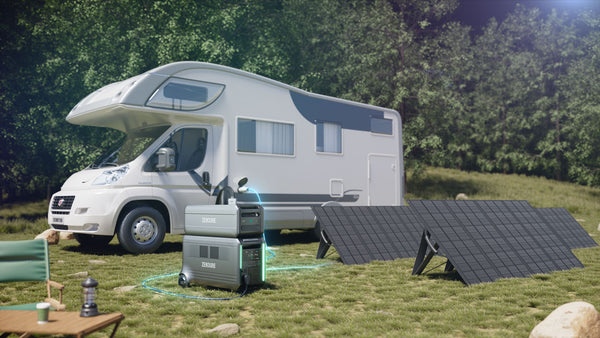
Popular FAQs About Solar Generator for RV
Q: Where should I place the solar panels on RV?
When it comes to placing solar panels on an RV, there are a few things to account for to achieve the utmost performance and efficiency.
Firstly, solar panels should be placed in an area that receives maximum sunlight exposure throughout the day. This typically means the roof of the RV, but be sure to avoid areas that are shaded by trees or other obstructions.
It's also necessary to adjust the tilt angle of the solar panels based on your location and the time of year. For instance, if you're in a location with low winter sun, you may need to adjust the tilt angle to maximize solar energy collection.
As for the orientation of the solar panels, it should be towards the north in the Southern Hemisphere and towards the south in the Northern Hemisphere. This will help to ensure that the panels receive as much sunlight exposure as possible.
The wiring for the panels should be properly installed to avoid shading and to make certain that the collected energy is efficiently transferred to your RV's battery.
You can also add a tilt and swivel mount that will allow you to adjust the angle and direction of the panels throughout the day for maximum energy absorption.
Q: What size solar generator do you need for RV?
Things like power consumption and trip duration determines the size of the solar generator suitable for your RV.
A good rule of thumb is that a small RV with minimal power needs may only require a 100-watt solar panel and a small battery bank. However, if you have a larger RV and plan on using multiple appliances, you may need a solar generator with a capacity of 1,000 watts or more.
To determine the exact size of the solar generator you need, you should calculate your power usage and maybe consult with a professional solar installer. They can help you choose the appropriate solar generator size based on your specific requirements and budget.
Q: Is a solar generator for RV worth it?
Whether a solar generator for RV is worth it depends on your individual circumstances. Below are some factors to consider:
- Frequency of Use: If you plan to use your RV frequently and for long periods of time, a solar generator can be a cost-effective option for providing power.
- Cost: A solar generator can be a significant investment, so you'll need to determine whether the cost is worth it for you. Consider how much you'll save in fuel costs and generator maintenance over time.
- Convenience: A solar generator can be a convenient option, since it doesn't require fuel and can be set up quickly and easily. But you'll want to make sure you have enough solar panels to generate sufficient power.
- Energy Demands: Consider the amount of energy you'll need to run your RV devices and appliances. A solar generator may not be sufficient if you have high power demands, such as running air conditioning.
- Environmental Impact: Solar generators are a clean energy source, making them an environmentally friendly option compared to traditional generators.
To sum up, if you plan to use your RV frequently, want an environmentally friendly option, and have moderate power needs, a solar generator can be a worthwhile investment. But if you have high energy consumption or only use your RV occasionally, a solar generator may not be necessary.
Q: How to connect a solar generator to RV?
Connecting a solar generator to an RV can be relatively easy, depending on the specific equipment you have and your level of familiarity with electrical systems. But the process typically involves the following steps:
- Set up the solar panels: Mount the solar panels on your RV's roof or on a nearby surface that gets plenty of direct sunlight. Use the connectors and cables that come with the panels to connect them to the solar generator.
- Connect the solar generator: Hook up the solar generator to your RV's electrical system using an appropriate power cord. This will allow the generator to supply power to your RV's AC outlets and charge its batteries.
- Monitor the system: Keep an eye on the performance of your solar generator and RV electrical system. Make sure that the solar panels are receiving enough sunlight to generate power, and that the generator is providing sufficient energy to meet your RV's needs.
When you're finished using the generator, let it cool down before storing it properly. Disconnect it from the RV and any other electrical devices, and store it in a secure, dry location.








